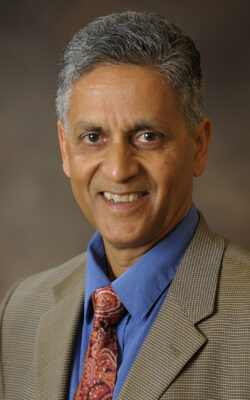Keynote: Omni-Layer Intelligence Requires Cross-Layer Self-Awareness
Speaker: Nikil Dutt, Distinguished Professor of CS, EECS & Cognitive Sciences, UC Irvine, USA
Talk Summary: The principle of layered design abstractions has facilitated the development of myriad applications, ranging from small form-factor IoT devices to complex system-of-systems. While this clean separation of abstraction levels eases the task of modeling, design, validation and verification, these systems demand a tight coupling of computation, communication and control across the abstraction stack to meet energy, performance, reliability and security needs. Furthermore, the fast-evolving landscape of emerging computing substrates, coupled with highly dynamic operational behaviors operating in varying environmental conditions poses significant challenges to meet the (often conflicting) goals of resiliency, energy, heat, cost, performance, security, etc. I posit that effective deployment of intelligence across the abstraction stack necessarily requires a cross-layer approach, coupled with computational cognitive intelligence (CCI) principles that enable the system to learn and evolve at runtime. A key feature of the CCI paradigm is computational self-awareness through introspection (i.e., modeling and observing its own internal and external behaviors) combined with both reflexive and reflective adaptations via cross-layer physical and virtual sensing and actuations applied across multiple layers of the system abstraction stack. In this context, omni-layer intelligence requires a fundamental change from classical layered computing to a cross-layer CCI paradigm that embodies self-awareness principles. In the past decade we have applied these concepts across multiple projects spanning nanoscale computing, healthcare IoT, data center memory, and end-to-end computational pipelines for autonomous systems. The rise of generative AI, coupled with distributed autonomy poses new challenges for detecting and managing emergent behaviors to ensure system safety. I will close with some thoughts on how CCI principles and cross-layer self-awareness might be applied to address these challenges.
Biography: Nikil D. Dutt is a Chancellor’s Professor at the University of California, Irvine, with academic appointments in the CS, EECS, and Cognitive Sciences departments. He received a B.E.(Hons) in Mechanical Engineering from the Birla Institute of Technology and Science, Pilani, India in 1980, an M.S. in Computer Science from the Pennsylvania State University in 1983, and a Ph.D. in Computer Science from the University of Illinois at Urbana-Champaign in 1989. He is affiliated with the following Centers at UCI: Center for Embedded Computer Systems (CECS), Center for Cognitive Neuroscience and Engineering (CENCE), California Institute for Telecommunications and Information Technology (Calit2), the Center for Pervasive Communications and Computing (CPCC), and the Laboratory for Ubiquitous Computing and Interaction (LUCI). Professor Dutt’s research interests are in embedded systems, electronic design automation, computer architecture, optimizing compilers, system specification techniques, distributed systems, formal methods, and brain-inspired architectures and computing. He is a coauthor of seven books: “High-Level Synthesis: Introduction to Chip and System Design”, Kluwer Academic Publishers, 1992, “Memory Issues in Embedded Systems-on-Chip: Optimizations and Exploration”, Kluwer Academic Publishers, 1999, “Memory Architecture Exploration for Programmable Embedded Systems”, Kluwer Academic Publishers, 2003, “SPARK: A Parallelizing Approach to the High-Level Synthesis of Digital Circuits”, Kluwer Academic Publishers, 2004, “Functional Validation of Programmable Embedded Architectures: A Top-Down Approach”, Springer-Verlag, 2005, “On-chip Communication Architectures: Current Practice, Research and Future Trends,” Morgan Kaufman/Elsevier Systems-on-Silicon Series, 2008, and “Processor Description Languages: Applications and Methodologies,” Morgan Kaufman/Elsevier Systems-on-Silicon Series, 2008. Professor Dutt’s research has been recognized by Best Paper Awards at the following conferences: CHDL’89, CHDL’91, VLSI Design 2003, CODES+ISSS 2003, CNCC 2006, ASPDAC 2006, IJCNN 2009, and DATE 2012; and Best Paper Award Nominations at: WASP 2004, DAC 2005, VLSI Design 2006, and CASES 2011. He has also received a number of departmental and campus awards for excellence in teaching at UC Irvine. Professor Dutt currently serves as Associate Editor of ACM Transactions on Embedded Computer Systems (TECS) and of IEEE Transactions on VLSI Systems (TVLSI). He served as Editor-in-Chief of ACM Transactions on Design Automation of Electronic Systems (TODAES) between 2004-2008. He was an ACM SIGDA Distinguished Lecturer during 2001-2002, and an IEEE Computer Society Distinguished Visitor for 2003-2005. He has served on the steering, organizing, and program committees of several premier CAD and Embedded System conferences and workshops. His recent major conference activity includes: ESWeek Steering Committee Chair and TPC Co-Chair DAC-2010/2011. He currently serves on, or has served on the ACM Publications Board, the advisory boards of ACM SIGBED, ACM SIGDA, and IFIP WG 10.5. He is a Fellow of the IEEE, an ACM Distinguished Scientist, and an IFIP Silver Core awardee.



